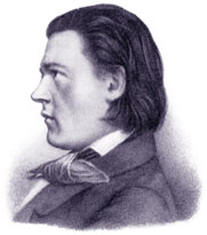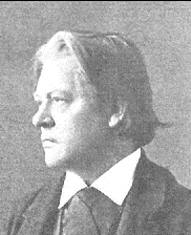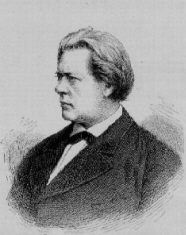|
|
Theodor Kirchner (Composer, Arranger) |
|
Born: December 10, 1823 - Neukirchen, near Chemnitz, Saxony, Germany
Died: September 19, 1903 - Hamburg, Germany |
|
Life |
|
The siginificant German composer, (Fürchtegott) Theodor Kirchner, was one of the most gifted disciples of Robert Schumann, and a composer of 'genre pieces' for the pianoforte. An accomplished organist and pianist at the age of 8, he had his musical training at Leipzig, under C.F. Becker, from 1838.
Theodor Kirchner enjoyed the friendship and admiration of many leading composers of the 19th century yet was unable to maintain a successful career, apparently due to a disordered way of life which included extravagant spending and an addiction to gambling. Having completed his schooling at Leipzig and Dresden, he took the post of organist at Winterthur in Switzerland in 1843 on the recommendation of Felix Mendelssohn. He remained there for nearly 20 years, but travelled much in Germany, befriending the Schumanns and Johannes Brahms. (Clara Schumann was very fond of him, though she wrote that 'in his character there is no stability', and it appears they had a discreet affair in the early 1860's). In 1862 he moved to Zürich as the director of the subscription concerts there and also a teacher. This only lasted three years and he then embarked on an itinerant career as pianist and accompanist.
Theodor Kirchner married in 1868 but the marriage was not a success. After a spell from 1870 as organist in Zürich he moved to Meiningen as court pianist in 1872 and next year (1873) was made director of the Musikschule in Würzburg. But after two years he threw up that appointment and settled in 1876 at Leipzig, where he lived until 1883, when he when he moved to Dresden as a. teacher (score-reading) of ensemble in the Conservatorium, a post he held until 1890. In 1884 J. Brahms, Hanslick, Niels Wilhelm Gade, Grieg and Hans von Bülow raised 30,000 marks to enable Kirchner to pay off his gambling debts. In 1890 he abandoned his wife and family and moved to Hamburg, where he was looked after by a former pupil. Two strokes left him paralysed in 1894 and he became completely blind in his last years. |
|
Music |
|
Theodor Kirchner was esteemed by among others Felix Mendelssohn, Robert Schumann (who wrote approvingly of him in Neue Zeitschrift für Musik), Johannes Brahms, Franz Liszt, Wagner and Grieg. He was a gifted arranger whose transcriptions include the realization of J. Brahms's two String Sextets as Piano Trios; he also made the vocal score of J. Brahms's German Requiem and solo piano arrangements of the Third and Fourth Sets of Hungarian Dances and the Liebeslieder Walzer.
Theodor Kirchner's works extend to over 100 opus numbers. As a composer he was an intense Romantic lyricist and a natural miniaturist Except a string quartet, Op. 20, a Gedenkblatt, a Serenade and Novelletten, Op. 59, for piano, violin and violoncello, some violin pieces, Op. 63, and eight pieces for violoncello, Op. 79, and a number of Lieder, they are all written for pianoforte solo or duet. He is credited with having written over 1,000 piano pieces (mainly collected in cycles) of which many are only a minute or so in duration - a kind of 19th-century forerunner of Anton Webern's Bagatelles. These miniatures put forth under suggestive titles such as Robert Schumann was wont to give to his lesser pieces. The stamp of Robert Schumann's original mind has marked Kirchner's work from the first; yet though sheltered under Robert Schumann's cloak, many minor points of style and diction are Kirchner's own, and decidedly clever. At best, his pieces are delicate and tender, frequently vigorous, now and then humorous and fantastic; at worst, they droop under a taint of lachrymose sentimentality. They are always carefully finished and well shapen, never redundant, rarely commonplace. Among his early publications, Albumblatter, Op. 9, became popular as played by Madame Clara Schumann. Among his later should be mentioned: Waltzes, Op. 23, composed in 1876 and dedicated to J. Brahms, the suite of 'characteristic pieces', Still und bewegt, Op. 24, and Nachtstücke, Op. 25, which quotes J. Brahms's song Wie bist du, meine Königen. There are also some organ pieces and songs and a few choral and chamber works, but no orchestral music at all, though his friend Heinrich Schülz-Beuthen made an orchestral suite out of some of Kirchner's piano pieces. |
|



|
|
Source: Groves Dictionary of Music and Musicians (1952 Edition; Author: Edward Dannreuther); Wikipedia Website
Contributed by Aryeh Oron (July 2007) |
|
Theodor Kirchner : Short Biography | Piano Transcriptions: Works | Recordings |
|
Links to other Sites |
|
Leben, Werk und umkreis des romantischen klavierkomponisten Theodor Kirchner [German/English]
Theodor Kirchner Biography (Vision of Paradise)
Kirchner Theodor (Swiss Classic) |
Theodor Kirchner (Wikipedia) [English]
Theodor Kirchner (Wikipedia) [German]
Theodor Kirchner Biography (Naxos)
Theodor Kirchner Serenade for Piano Trio (1879) Sound-bite & short bio (Edition Silvertrust) |
|
Bibliography |
| |
|
|